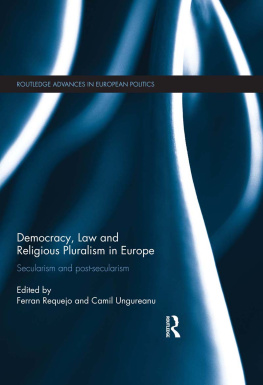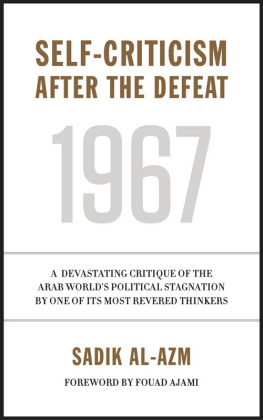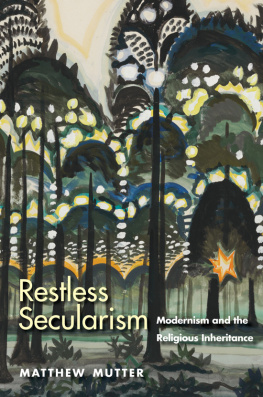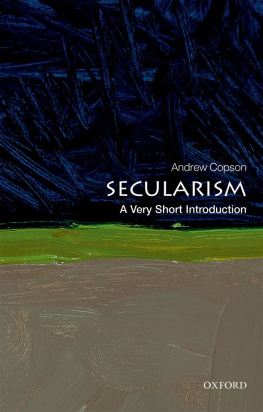

Pitchstone Publishing
Durham, North Carolina
www.pitchstonepublishing.com
Copyright 2014 by Ronald A. Lindsay
Passages from the following articles written by the author have been incorporated, in modified form and with permission, in this book:
Do We Want To Convert the Religious? Free Inquiry 31, no. 3 (2011): 46. Copyright 2011 The Council for Secular Humanism.
Oregons Experience: Evaluating the Record, American Journal of Bioethics 9, no. 3 (2009): 1927. Copyright 2009 Taylor & Francis Group, LLC.
Neutrality Between Religion and Irreligion: Is It Required? Is It Possible? Free Inquiry 10, no. 4 (1990), 1720. Copyright 1990 The Council for Secular Humanism.
Library of Congress Cataloging-in-Publication Data
Lindsay, Ronald A. (Ronald Alan)
The necessity of secularism : why God cant tell us what to do / Ronald A. Lindsay.
pages cm
Summary: For the first time in human history, a significant percentage of the worlds population no longer believes in God. This is especially true in developed nations, where in some societies nonbelievers now outnumber believers. Unless religion collapses completely, or undergoes a remarkable resurgence, countries across the globe must learn to carefully and effectively manage this societal mix of religious and irreligious. For in a world already deeply riven by sectarian conflict, this unprecedented demographic shift presents yet another challenge to humanity. Writing in an engaging, accessible style, philosopher and lawyer Ronald A. Lindsay develops a tightly crafted argument for secularismspecifically, that in a religiously pluralistic society, a robust, thoroughgoing secularism is the only reliable means of preserving meaningful democracy and rights of conscience. Contrary to certain political pundits and religious leaders who commonly employ the term secularism as a scare word, Lindsay uses clear, concrete examples and jargon-free language to demonstrate that secularism is the only way to ensure equal respect and protection under the lawfor believers and nonbelievers alike. Although critical of some aspects of religion, Lindsay neither presents an antireligious tirade nor seeks to convert anyone to nonbelief, reminding us that secularism and atheism are not synonymous. Rather, he shows how secularism works to everyones benefit and makes the definitive case that the secular model should be feared by noneand embraced by allProvided by publisher.
ISBN 978-1-939578-12-9 (paperback)
1. Secularism. 2. SecularismPolitical aspects. 3. Religious pluralismPolitical aspects. 4. Freedom of religion. I. Title.
BL2747.8.L56 2014
322.1dc23
2014013748
For David and Anne
This fair child of mine shall sum my count and make my old excuse.
Shakespeare, Sonnet 2. 1011.
CONTENTS

Index
INTRODUCTION

The devil caught you at third base. The nun who uttered that admonition to me when I was seven years oldafter I had erred in making the sign of the cross (going right before left)didnt realize how prophetic she was. At least from a Catholic perspective, the devil did catch me when I was about twenty-one, as that is when I ceased to believe in God.
The transition from Catholic to atheist did not take place overnight. It was an emotionally wrenching process that took several months, causing many sleepless nights, a sense of anomie, and anxiety attacks. I was not a nominal Catholic. I believed deeply and I hewed closely to the official Church position on just about everything. The first article I ever had published consisted of a highly polemical essay against contraception. Before I stopped believing, I had even taken preliminary steps to becoming a priest. (That I did not become a priest, thereby undoubtedly sparing the Church much trouble, may be the one authentic miracle the Church can claim.) Giving up my beliefs was not easy.
That said, I have no resentment or regrets over the fact that I was raised Catholic. In fact, in retrospect I regard it as fortunate that I remained a Catholic until early adulthood. Why? It gives me some understanding of the perspective of believers: why they hold fast to their beliefs and how many of them tend to view moral issues. My experience also dispels one myth about the religious accepted by all too many atheistsnamely, that the religious are stupid. No, I dont think I was stupid when I was younger, just mistaken.
The fact that I have been both a believer and a nonbeliever also gives me a heightened awareness of the novel, challenging situation in which the United States and many other countries now find themselves. For the first time in human history, we have substantial numbers of nonbelievers living side by side with believers. Moreover, this is a situation that is likely to persist for some time. The number of nonbelievers is going to increase in developed countries, but religion is not going to disappear in a few years, if ever.
One shared problem we face going forward is that believers often do not speak the same language as nonbelievers, especially when it relates to moral issues or public policy questions that have moral dimensions. I know. When I was a believer, my views on moral issues were based principally on scripture or the teachings of the Catholic Church. Even the positions I held that appeared to be derived from secular reasoning frequently had a religious base. Scrape the top off an argument that supposedly relies on natural law and youre likely to find theology underneath.
Taking positions based on religious doctrine may seem to work well enough in a society where one religion dominates. It definitely does not work well in a religiously pluralistic society that includes not only diverse religious groups but also a large number of nonbelievers. If believers persist in relying upon religious doctrines in public policy matters they will fail to engage those who do not speak their religious language. A well-functioning democracy requires citizens to talk to each other in terms everyone can understand. I dont think a breakdown in democratic discourse will necessarily lead to violence, but it may lead to the fracturing of our societies along religious lines, with political parties becoming aligned with different religious (or irreligious) groups. The push for sharia courts in some European countries may be a harbinger of this development. Already in the United Kingdom, sharia councils have been allowed to arbitrate disputes among Muslims. Although in theory the decisions of these councils must not conflict with British law, this is not always the case. More troublingly, in March 2014, British lawyers were provided with guidance on how to draft sharia-compliant wills that would also be recognized under the British legal system. This is a big step toward the creation of a parallel legal system. Creation of parallel legal systems for people of different faiths would not be an auspicious turn of events. Indeed, it would mean the end of the notion that there is one law for all. We should do everything we can to avoid such an outcome.
We need to foster a truly democratic society, in which all persons are treated alike and all persons have a voice in governance. To achieve that end, at a minimum, we must respect those with different religious views. One important step we can all take is not to judge people based on their religious beliefs (and, in this context, that includes atheism). These beliefs do not necessarily indicate either a persons intelligence or character. I have known both nonbelievers and believers who were obtuse, despicable, greedy, mendacious, and just plain odious. And I have been fortunate to know many more nonbelievers and believers who were intellectually curious, honorable, generous, trustworthy, and just plain delightful. I dont think my experience is unique.
Next page







